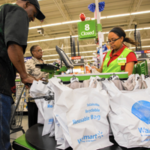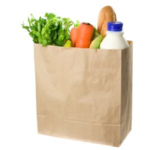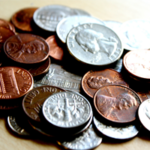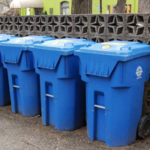Why Are There Still Plastic Bags at the Grocery Store?

Dec. 8, 2016 — Way back in the old days (before Nov. 8, that is) your trip to a grocery store in California frequently ended with two options: paper or plastic. Since then, voters across the state passed Proposition 67, and California became the first state in the nation to ban single-use plastic bags. Now you are faced with two new options at the grocery store: paper or reusable.
But wait … why does it look like grocery stores are still offering plastic bags? And why are you getting charged for taking bags? What does this new era of grocery shopping mean?
Have no fear! We’ve compiled a Prop 67 sheet to address all of your questions about the bill and what will happen at the checkout stand going forward.
 Why are some grocery stores still offering plastic bags at the checkout?
Why are some grocery stores still offering plastic bags at the checkout?
While it does look like plastic bags are still an option at some stores (we’ve seen them at Ralphs, Vons, CVS, and Smart & Final), these bags are different than the ones you’re used to seeing. The new law forbids grocery stores from providing single-use plastic bags to customers, even if they sold it for a fee. Instead, stores can sell thicker-skinned bags that can be reused at least 125 times over its lifetime. (And the reusable bag must be able to carry 22 pounds over a distance of 175 feet and must be at least 2.25 mm thick, if you want to be exact.)
These reusable bags can be made of plastic, so yes, they can still pose a threat to ocean animals. While this bill is not perfect (no bill can be passed without some compromise!), getting rid of all those flimsy one-use bags will still have incredible positive impacts on California’s waste stream and environment. We’ve already seen significant reduction in the amount of plastic bags in cities that had their own bag bans in place before Prop 67 passed. In the one year since its bag ban was enacted, the city of San Jose saw a 76% reduction in creek and river litter, a 59% drop in park and roadside plastic bag litter, and a 69% reduction in plastic bag litter in storm drains.
This shows how just a simple change in consumer behavior can have a significant impact on the environment. Millions of Californians in the more than 150 cities and counties that already had their own bag bans have proved that it’s easy and effective.
 What does the law say about paper bags?
What does the law say about paper bags?
The law states that paper grocery bags must contain a minimum of 40% post-consumer recycled materials. Smaller paper bags, like the ones you would typically find in the produce or deli sections, must contain a minimum of 20% post-consumer recycled materials. Many stores are offering paper bags that are made out of 100% post-consumer recycled materials, which is a good thing.
However, there are still environmental consequences from the production and distribution of paper bags. Though Proposition 67 banned single-use plastic bags, the bag ban has also caused a dramatic decrease of paper bags used across the state. Because shoppers are bringing reusable bags with them to the grocery store, the use of paper bags in Los Angeles dropped by about 40% since its bag ban went into effect.
So bring your own durable reusable bag with you. When the checkout clerk asks you if you want paper or reusable plastic, you already have your answer – neither!
 How much can I be charged for a paper or reusable bag?
How much can I be charged for a paper or reusable bag?
According to the law, a grocery store must charge at least 10 cents for a paper or reusable grocery bag. This was put in the bill to ensure that the cost of providing a reusable grocery bag is not subsidized by a customer who does not need that bag. However, stores can charge more than 10 cents for a bag if they want to, just as they can set the price point for any other good sold.
Participants in WIC or CalFresh (SNAP) using a voucher or EBT card are exempt from the bag fee and reusable or paper bags must be offered to these customers free of charge.
I heard people opposing Prop 67 say that the grocery stores are being greedy and are making a profit by charging us for bags. Is that true?
Simply put, this was a lie spread by the plastic bag manufactures to spook people into voting against the proposition. The law clearly states that the money collected from bag sales may be used only for the following purposes:
- Costs associated with complying with the law.
- Actual costs of providing recycled paper bags or reusable grocery bags.
- Costs associated with a store’s educational materials or educational campaign encouraging the use of reusable grocery bags.
Are plastic produce bags still allowed? Are we being charged for them?
Yes – plastic produce bags, meat bags, and bread bags are exempt from this law. While the law does not require that a store charges for the sale of these bags, the store can if it wants to, just as it can set the price for any good it sells. It seems that most stores are continuing with business as usual, which means that the cost of the bags are lumped in with other operational costs that are absorbed in the price of the goods you buy.
What types of stores are included in the ban? What types of stores are exempt?
Plastic bags are banned from the following types of stores:
- Grocery stores (e.g. Albertson’s, Ralphs, Target, Walmart, Vons, 99 Cent Only, etc.)
- Drug stores and pharmacies (e.g. Walgreens, CVS, Rite Aid, etc.)
- Convenience food stores and food-marts (e.g. 7-Eleven, AM PM Mini Markets, etc.)
- Liquor stores (e.g. BevMo, local liquor stores, mini-marts, etc.)
The following types of stores are exempt from the plastic bag ban:
- Restaurants
- Farmers markets
- Hardware stores (e.g. Home Depot, Lowes, etc.)
- Retail stores (e.g. Macy’s, JC Penny, Ross, TJ Maxx, etc.)
 What should I do with all of the plastic bags I’ve saved under my kitchen sink?
What should I do with all of the plastic bags I’ve saved under my kitchen sink?
With the New Year approaching, now is a great time to set your resolution to free yourself of single-use plastic! The best thing to do is recycle the single-use plastic bags you have. Did you know that in the City of Los Angeles, you can put them straight into your blue curbside recycling bin? We recommend you bundle them all together in one bag to reduce the chances of them flying away in transport and becoming pollution. If you don’t live in L.A., check with your city about what is and is not accepted in your curbside recycling program. You can also check out Earth911 to search for recycling facilities near you. Most grocery stores collect plastic bags for recycling as well.
Want to nerd out and read all of the policy language written into the bill?
We did! You can read the bag ban’s official text on the California Legislature’s website.


